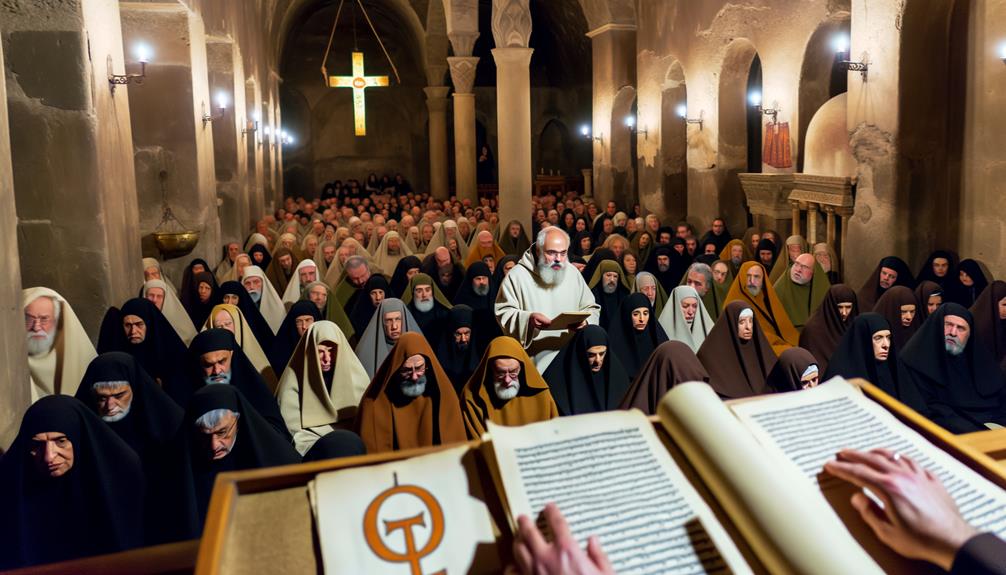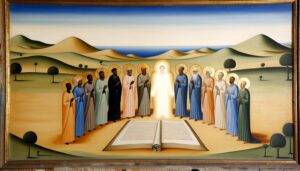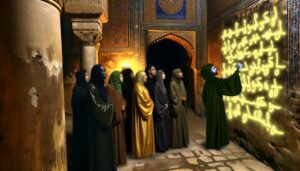Word of Knowledge Meaning in the Bible: Divine Insight
The ‘Word of Knowledge’ in biblical context, as noted in 1 Corinthians 12:8, is a distinct spiritual gift signifying divine insight granted by the Holy Spirit. It enables believers to receive revelations of God’s hidden truths and apply them constructively within the Christian community. This gift often works in conjunction with the ‘word of wisdom in the bible,’ which allows individuals to apply the insights gained through the Word of Knowledge in practical and impactful ways. Believers who possess this gift are seen as conduits for God’s guidance, providing clarity and understanding in complex situations. Together, these gifts foster spiritual growth, unity, and discernment within the church, empowering members to fulfill their divine purpose.
Its purpose is underscored by the need for communal edification and alignment with scriptural truths (Colossians 2:3, Ephesians 4:12). Historically esteemed by early Church leaders and revitalized in contemporary charismatic movements, this gift offers profound discernment for specific situations, as echoed in 1 Corinthians 2:10-11.
To uncover the broader implications of this spiritual gift, further engagement is encouraged.

Word of Knowledge Meaning in the Bible: Spiritual Gift and Its Significance
| Aspect | Description |
|---|---|
| Key Bible Verse | 1 Corinthians 12:8 – “To one is given through the Spirit the message of wisdom, to another the message of knowledge by the same Spirit.” |
| Definition | A spiritual gift where God imparts specific knowledge, insight, or understanding that the person could not have known naturally. |
| Spiritual Significance | Demonstrates God’s direct communication with believers to reveal truths, guide decisions, and strengthen faith within the body of Christ. |
| Purpose in the Church | Used to edify, encourage, and bring clarity to individuals or the church community, often confirming God’s will or exposing hidden matters for healing. |
| Difference from Wisdom | The word of knowledge reveals facts or truths, while the word of wisdom provides the ability to apply knowledge effectively in specific situations. |
| Biblical Examples | Jesus with the Samaritan woman (John 4:16-18), Peter knowing Ananias and Sapphira’s deceit (Acts 5:1-10). |
| Application for Believers | Encourages sensitivity to the Holy Spirit, discernment, and readiness to receive and share God’s revelations for personal growth and community edification. |
| Modern Interpretation | Seen as a way God continues to speak to believers, offering divine insight for guidance, healing, and confirmation of His presence in everyday life. |
Scriptural Basis

The concept of the ‘word of knowledge‘ finds its foundational basis in the New Covenant, particularly within 1 Corinthians 12:8, where the Apostle Paul enumerates it as one of the spiritual gifts bestowed by the Holy Spirit.
This gift, distinct from general knowledge, is a divinely imparted insight that transcends human understanding, intended for edification, guidance, and revelation within the Christian community.
Paul’s epistles underscore that this manifestation operates via the Holy Spirit, providing believers with supernatural discernment and wisdom pertinent to specific situations (1 Corinthians 2:10-11).
Theologically, it emphasizes the dynamic role of the Spirit in communicating God’s mysteries (Colossians 2:3), fostering unity and spiritual growth.
This gift aligns with the broader Pauline theology of charismata—gracious gifts meant to serve and build up the body of Christ.
Historical Context

Historically, the understanding and application of the ‘word of knowledge’ has evolved within various Christian traditions, leading to significant theological implications from its practice. The ‘word of knowledge,’ as referenced in 1 Corinthians 12:8, has been subject to diverse interpretations and applications:
- Patristic Period: Early Church Fathers viewed it primarily as divine insight granted to leaders for edification.
- Medieval Church: It was often associated with monastic wisdom and scholasticism.
- Reformation: Reformers like Luther emphasized scriptural knowledge over mystical experiences.
- Modern Charismatic Movement: Emphasizes direct, supernatural revelation for personal and communal guidance.
These shifts reflect broader theological debates on the nature of divine revelation and the role of spiritual gifts within the ecclesiastical framework.
Early Church Practices

In the early church, the usage of spiritual gifts, including the word of knowledge, was integral to communal worship and edification, as evidenced in 1 Corinthians 12:8.
Apostolic teachings emphasized the importance of these gifts for building up the body of Christ, aligning with the theological framework established by New Covenant writers.
This emphasis not only facilitated the spread of the gospel but also strengthened the believers’ faith and understanding.
Spiritual Gifts Usage
Early Church practices surrounding spiritual gifts, such as the word of knowledge, are well-documented in scriptural passages like 1 Corinthians 12-14, which detail their use in edifying the community and strengthening the faith of believers. These gifts were integral to the early Christian experience, facilitating divine communication and mutual support within the assembly.
Key aspects of their usage include:
- Edification: Gifts served to build up the church (1 Corinthians 14:12).
- Revelation: The word of knowledge provided divine insights (1 Corinthians 12:8).
- Orderly Conduct: Spiritual gifts were exercised in an orderly manner (1 Corinthians 14:40).
- Unity and Diversity: Various gifts were given to different members to promote unity (1 Corinthians 12:4-11).
Apostolic Teachings Emphasis
Apostolic teachings in the early church placed significant emphasis on the practical application of spiritual gifts, as seen in Paul’s epistles, particularly in the detailed instructions found in 1 Corinthians 12-14.
These chapters underscore the distribution of diverse gifts by the Holy Spirit for the edification of the church body (1 Cor. 12:7-11).
Paul addresses the ‘word of knowledge‘ (1 Cor. 12:8) as a distinct gift, which, when exercised, should foster unity and mutual growth.
The apostle’s guidance emphasizes orderly worship and the responsible use of gifts to build up the community (1 Cor. 14:26-33).
This apostolic focus reflects a theological framework wherein spiritual gifts serve to manifest divine wisdom and foster communal harmony.
Characteristics of the Gift

The Gift of the Word of Knowledge, as delineated in 1 Corinthians 12:8, manifests through divinely imparted insights that surpass natural human understanding, enabling recipients to perceive and articulate profound truths for edification.
This spiritual gift bears distinct characteristics, which can be outlined as follows:
- Supernatural Insight: Recipients receive knowledge that is beyond human ability, often revealing hidden truths (1 Samuel 9:19).
- Edification of the Church: It serves to build up the body of Christ, providing guidance and correction (Ephesians 4:12).
- Alignment with Scripture: Insights gained must be consistent with biblical teachings, ensuring doctrinal purity (2 Timothy 3:16).
- Momentary Revelation: This knowledge is often situational, given at specific times for specific needs (Acts 5:3-4).
These characteristics underscore the divine origin and purpose of the gift.
Modern-Day Applications

Understanding the characteristics of the Gift of the Word of Knowledge allows us to explore its modern-day applications within contemporary Christian practice.
This spiritual gift, rooted in 1 Corinthians 12:8, manifests through divine insights given to believers, empowering them to provide counsel, resolve conflicts, and offer prophetic encouragement.
Within pastoral care, it aids in diagnosing spiritual conditions and directing congregational strategies.
Similarly, in intercessory prayer, it reveals hidden truths, guiding effective petitions.
Additionally, evangelistic efforts benefit as it discloses personal details that resonate with seekers, affirming the gospel’s authenticity.
Therefore, the Word of Knowledge remains a pivotal tool, fostering deeper spiritual engagement and communal growth in the body of Christ.
Differentiating From Other Gifts

Differentiating the Word of Knowledge from other spiritual gifts necessitates a thorough examination of its unique characteristics and functions as delineated in the Scriptures.
Unlike the gift of prophecy, which often involves foretelling future events (1 Corinthians 14:3-4), the Word of Knowledge pertains to a supernatural insight into facts or information by divine revelation (1 Corinthians 12:8).
It is distinct from:
- Wisdom – Practical application of knowledge (James 1:5).
- Faith – Exceptional trust in God’s promises (1 Corinthians 12:9).
- Healing – Supernatural restoration of health (1 Corinthians 12:9).
- Discernment – Identifying spirits or spiritual realities (1 Corinthians 12:10).
This delineation helps believers understand the specific role and manifestation of the Word of Knowledge within the broader context of spiritual gifts.
Personal Testimonies

Personal testimonies offer invaluable insights into the practical application and transformative impact of the Word of Knowledge within the lives of believers, often corroborated by scriptural truths and divine experiences. These accounts not only provide empirical evidence but also encourage others to seek and recognize this spiritual gift. For instance, testimonies may highlight how a timely revelation aligned with 1 Corinthians 12:8 has steered individuals away from peril or provided divine wisdom in significant moments.
| Testimony | Scriptural Correlation |
|---|---|
| Averted disaster through divine insight | 1 Corinthians 12:8 |
| Received wisdom during pivotal decisions | James 1:5 |
| Strengthened faith through confirmed Word | Hebrews 11:1 |
These testimonies emphasize the Word of Knowledge’s profound role in contemporary Christian life.
Conclusion
In examining the biblical concept of the word of knowledge, its scriptural foundation, historical context, and characteristics offer profound insights into its role in early church practices and modern-day applications.
This gift, distinct from other spiritual gifts, continues to be a crucial component of Christian life.
How might contemporary believers cultivate and apply this divine wisdom in their spiritual journeys?
Reflecting on personal testimonies elucidates the enduring significance and transformative potential of this spiritual endowment.






